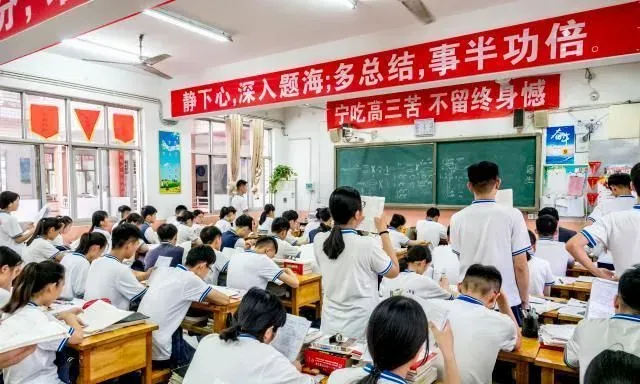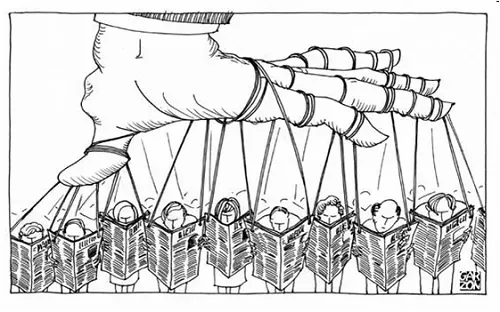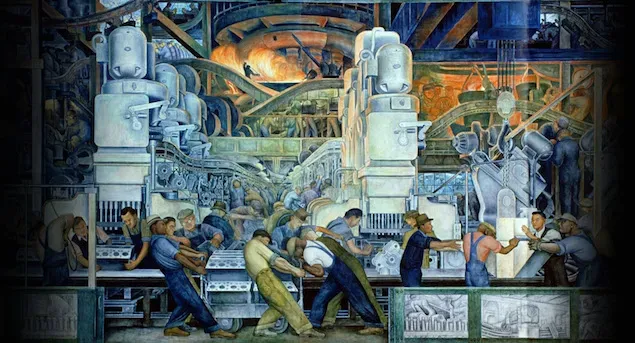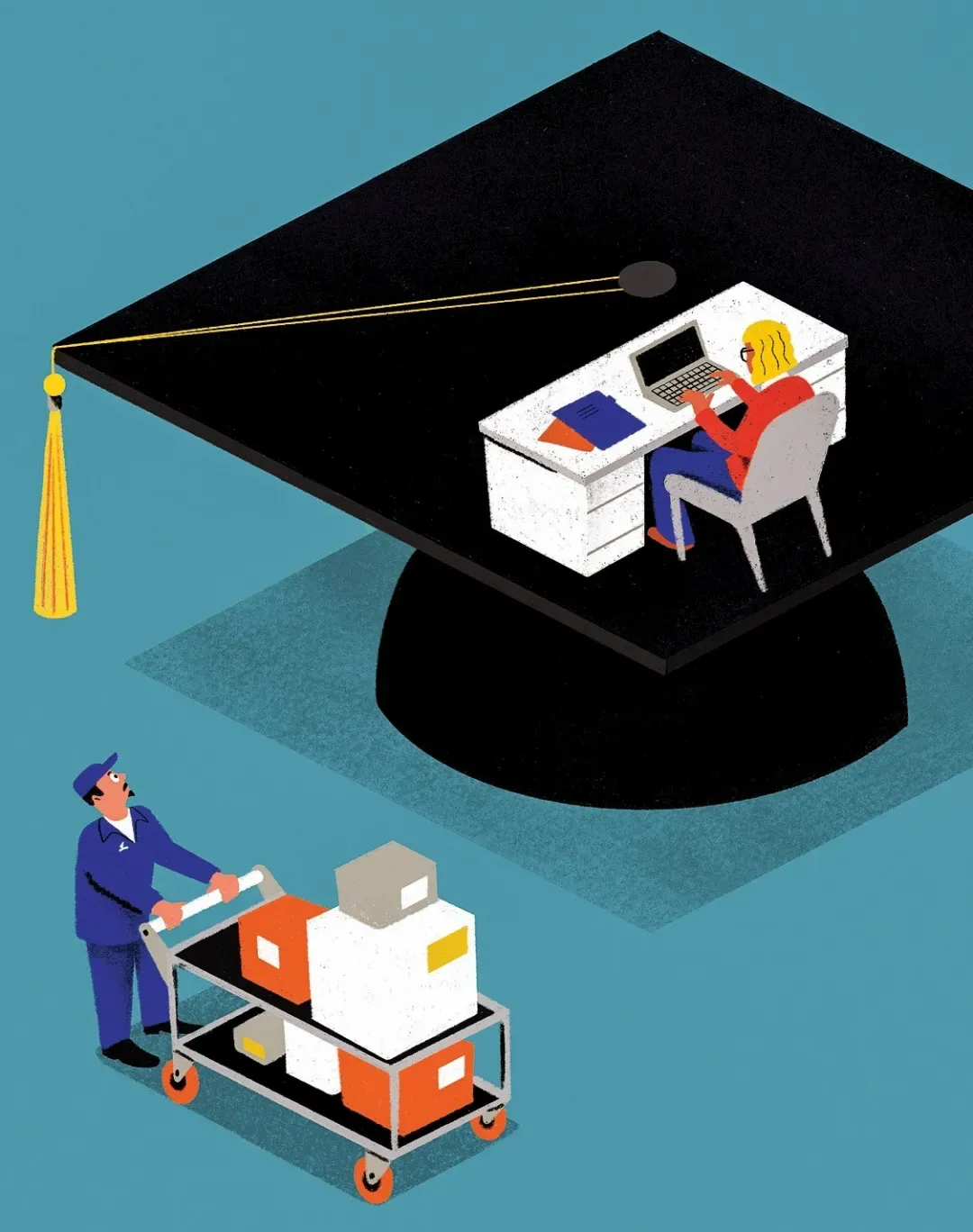How did we come to recognize the “involution” of education?

"This article was originally published on the public account philosophia Philosophy Society on December 26, 2020"
Author / Useless
Recently, "involution" has become a hot word in society, and the discussion on it has extended to various fields. This article will focus on "involution" in the field of education. This includes the fierce and homogeneous competition in college entrance examinations, university admissions, and overseas study, which has expanded to middle schools, elementary schools, and extracurricular tutoring institutions, as well as the high time investment in repetitive "learning" and the disconnection between learning content and results and employment and personal growth.
Although there is no shortage of criticism of such phenomena in public opinion, it is undeniable that these phenomena still exist and are even getting worse. It seems that, apart from escaping into the imagination of Li Ziqi's Peach Blossom Spring or constantly talking about their own identity as losers like the culture of mourning, people cannot actually imagine a possible lifestyle that transcends involution. Participation in involution is still seen as a helpless but absolutely rational choice. Intuitively, involution is a social phenomenon that requires everyone's "self-participation" to create, but it itself is constantly running "well". This fact shows that people still recognize the mechanism or lifestyle of involution. (This is just a simple statement, which will be further elaborated below.) Therefore, this article aims to explore how our recognition of educational involution is formed from an ideological level, and how it is "rationalized".
Therefore, this article is not a sociological article. It does not intend to focus on the factors or social impacts of the formation of educational involution, but only conducts a philosophical discussion around the ideological issues related to educational involution. However, this article also refuses to use the issue of educational involution as empirical material to prove certain philosophical theories. Although I will use Althusser's theory of ideological state apparatus and Lukacs' theory of reification to help analyze, I will still try my best to find "parts that do not fit these theories" in real experience.
1. The concept of involution
Involution as a sociological concept was first proposed by American sociologist Geertz when he was studying the agricultural economy of Java Island: In the agriculture of Java Island in the 19th century, the labor force invested in each unit of farmland continued to increase, and agriculture continued to be refined, but the growth efficiency of total agricultural output continued to decline. The increase in food output brought about by the investment of more labor was offset by the consumption of the labor itself, thus maintaining a stable state. Per capita food income and living standards did not increase significantly, but people lacked the motivation to break out of this stable state. Based on this specific example, Geertz abstracted the concept of involution as: "The process of continuous internal refinement and complexity of the system under the condition that the external expansion conditions are strictly limited." [1]
Later, scholar Huang Zongzhi creatively used the concept of "involution" when studying the agricultural economy near the Yangtze River Delta. He understood involution as "diminishing marginal returns to labor" [2] and further elaborated on the concept of "involution" as a "closed system": Why did agriculture in the Yangtze River Delta not automatically grow into capitalist farms or even give birth to capitalist industry and commerce? His explanation was: "The key mechanism is that a small farmer family can afford a higher rent, or land price, than a profit-making farm for a small piece of arable land, relying on its own cheap auxiliary family labor with only low opportunity cost, thereby completely excluding the latter." [3]
This article does not want to spend a lot of space discussing involution in the economic field. In this section, we only need to grasp a few core elements of involution: "growth without development", "high input and low efficiency" and involution as a "closed system" .
2 Characteristics of educational “involution”
The term "involution" has now been applied to all areas of society. For example, when wages are not expected to increase significantly, employees compete for overtime and work "996" to prevent themselves from being eliminated in the workplace competition. For example, companies in the market compete to hire "contract workers" who are not well protected by labor laws and welfare guarantees in order to reduce labor costs. Otherwise, they will not be able to win in the market competition. "Today, such "informal" labor has reached 75% of the total number of urban employees." [4] From this we can also see a new feature of involution that is different from the involution described by Geertz and Huang Zongzhi, that is, fierce competition. Whether in Java or in the agriculture of the Yangtze River Delta, participants in involution have never had such a deep fear of being eliminated in the competition, which is so strong in China today.
What about in the various areas of the education system? Let’s briefly enumerate them:
(1) Middle schools: Unlimited competition includes students doing more and more questions, students and teachers spending more and more time preparing for the college entrance examination, and parents spending more and more money on their children's studies in extracurricular tutoring institutions;
(2) University: Graduate school admission and study abroad. College students spend more and more time on certain exams for designated courses to get a higher GPA, and tirelessly participate in various activities to obtain various certificates of ability. In addition to the investment of time, money and energy, we also see the occupation of people's entire life and world of meaning by involutionary competition, and people become a kind of thing for the world, themselves functionalized, and become a means to win the competition. The former means that all people's activities begin to be aimed at winning the competition. As academic achievements, competition results, volunteer hours, student work, club activities and other achievements are included in the evaluation requirements for graduate school admission or study abroad, the value of these activities is reduced to the same set of discourses about "competitiveness"; the latter means that the society's judgment on whether a student is "rational", "normal", "mature" and "successful" is simplified to the judgment of whether his physical and psychological nature is suitable for participating in the competition. From this, it is not difficult for us to understand that the result of the investigation and assistance activities for students with depression in middle schools and universities some time ago was that a large number of students with mental illness chose to conceal their illness. Once their medical condition is recorded in official documents, they will easily be regarded as "unfit for competition" and thus face discrimination and obstacles in their choices of postgraduate study and employment.

In addition to the high intensity of competition in various senses, we should also pay attention to the homogeneity of competition , which will be explained in more detail later when I write about Lukacs. First of all, the core definition of "successful people", "social elites", "moral people" and even "normal people" in society (more precisely, capital and state power) is extremely narrow. No matter what profession or major you choose, you will eventually become a person who possesses wealth, political capital or cultural capital. It is unconsciously shaped and promoted as the image that everyone should pursue. On the other hand, the quantitative screening mechanism based on college entrance examination scores and GPA can only reflect the part of students' qualities that is determined by capital profits and bureaucratic performance that follow the logic of rationalization. Even if more factors are taken into account in the evaluation criteria (such as sports, music and art in the high school entrance examination), it is only the part of these factors that is most easily converted into capital profits and bureaucratic performance. Therefore, in fact, the factors that students can use to improve their competitiveness are given, homogeneous, and often accompanied by a lot of repetitive learning (this repetitive thing is often a kind of discipline itself) .
Secondly, involution sometimes appears subjectively as meaningless internal consumption . If we combine Geertz and Huang Zongzhi's "growth without development" with the "high-intensity, homogeneous competition" mentioned in this section, we can understand why it sometimes appears "meaningless" to each of us. There are two reasons for this:
(1) On the one hand, the benefits of high time and energy investment are becoming increasingly limited. This diminishing return on benefits is caused by competition itself: whether it is the college entrance examination or the guaranteed admission to graduate school, everyone participating in the competition often needs to invest several times more effort than before for a difference of a few points or even a few tenths of a point after exceeding a certain critical point, and these few points often only represent some very remote or few and difficult content, or even simply boring student work. In an ideal situation, as long as everyone gives up those few points, they can be liberated from such a long period of high-intensity study, but of course this can only remain in imagination. Because "hard work will not necessarily make things better, but not working hard will definitely make things worse";
(2) On the other hand, the uselessness of college entrance examination scores and GPA in direct labor and life (although they are "useful" when looking for a job) further makes involution seem meaningless.
Huang Zongzhi described educational involution as follows: “The same mechanism can be seen in the exam-oriented education sector. Faced with a rapidly increasing number of competitors and the accompanying decreasing opportunities, most schools force students to put in more and more ‘labor’ to prepare for exams in order to improve their own average test scores and their own quality assessments, which has led to a higher degree of involution in the exam-oriented education system, which already lacks innovation, and has basically ruled out educational reforms that focus more on innovation rather than rote learning.” However, I think that criticizing my country’s current educational involution as “hindering innovation” misses the point, which I will explain in detail later. [5]
3 Does the current society really "accept" the involution of education?
Before I start my analysis using Althusser and Lukacs, I would like to respond to a possible question: Do we really "agree" with educational involution?
Some people may point out that many of us now complain about involution and hope to live a life like Li Ziqi; and there are also subcultures such as mourning culture, "985 waste group", and "working people" that mock involution. Does this mean that we all agree with involution?
Here I would like to briefly use Hegel's master-slave dialectic to answer this question. First of all, we must know that "obedience" is not a completely passive behavior for both the person who demands obedience and the obedient. It should be regarded as an active "recognition". The establishment of authority is by no means a movement like moving a brick, or the magical relationship between a hypnotist and the hypnotized. On the contrary, the establishment of authority and the realization of obedience depend on the slave's active recognition of the master's authority. If a person who wants to achieve authority through violence refuses to recognize it because the other party is not afraid of death, then even if he scare him with death, he will not be able to establish his own authority. Those who achieve authority through violence recognize the authority of the other party because the other party actively establishes the concept of "I cannot die". Therefore, a person can be forced and actively recognize the authority of the other party, and a person can recognize authority and complain about "coercion". As long as he is still obeying, he agrees with this authority. It doesn't matter what concept he subjectively convinces himself with. For him, obeying this authority is still the most rational choice. Note that the "identification" here does not mean that people think that educational involution is good, but it means that, as Zizek describes ideology, "they know clearly (it is bad), but they do it calmly." Although we can give ourselves many excuses for participating in involution, such as "If we don't involution, we can't get into a good school, and if we can't get into a good school, we can't find a good job and make money", in reality, educational involution must be directly mediated by everyone's personal will to be truly realized. Involution only exists when everyone voluntarily obeys its norms. In other words, the situation of "if you don't involution, you can't make money" is caused by everyone's voluntary participation in involution. We rationalize our actions based on a presupposition, but in fact our actions themselves create this presupposition.
Therefore, when educational involution still exists in reality and becomes a fate that people who enter the education system almost inevitably face, it confirms the reality of recognition. We can draw a possible conclusion based on the statistical data of the questionnaire: most people hate educational involution, but this does not prevent them from recognizing it. As long as we have not found a way to push us to actually resist involution, as long as we are still practicing involution, then we must have some reasons to convince ourselves to recognize the reality of involution. I will touch on this point again when I talk about Althusser later. This is also what the French sociologist Bourdieu said, that the power in this educational system must be a power that can only be exercised with the active collusion of the power imposer or the power bearer, and the success of the activity depends on its bearers also working hard to promote its effectiveness. [6]
Moreover, even if we really use empirical data to verify the statistical results, we can get the same results. We know that even if a person thinks that involutionary education is "wrong", if he believes that the social distribution (i.e. various incomes) he gets from education is fair, then he still thinks that participating in involutionary education is "helpless but worthwhile". In the paper "Educational Level and Sense of Distribution Fairness: A Dual Investigation from the Perspective of Structural Status and Relative Deprivation" [7], three hypotheses were verified based on the results of more than 7,700 valid questionnaires and statistical operations:
1. “The relationship between education level and perception of income fairness generally shows that as education level increases, the proportion of people who believe that income is fair increases.”[8]
2. “Highly educated people who have achieved upward mobility are less likely to perceive their interests as being deprived. After controlling for individual income and social class status, the positive effect of education on the sense of distributive fairness is weakened.”[9]
3. “As the expected income gap increases, the probability of perceiving that personal income distribution is fair decreases more rapidly with higher education levels.”[10]
According to 1, we can see that, in general, compared with those junior and senior high school graduates who have no ability to participate in educational involution, it is precisely the college graduates who have experienced involution for a longer time and have participated in it more intensively who are more likely to recognize that the current income distribution method is fair. In other words, they believe that their investment in education has been appropriately rewarded. In other words, they agree that it is reasonable to invest a lot of time and money in their education (which is an important part of involutionary behavior) for the sake of current income. According to 3, we can see that high investment in education will lead to high income expectations. Therefore, those who have received more education will weaken their sense of fairness due to the gap between actual income and high income expectations, which is the result of weakening 1. However, we must understand that although their sense of fairness has been weakened, they do not disagree that "high job income should be achieved by high education investment". They just question why they have not received the due reward for participating in involution, but do not question involution itself. Of course, using income to rationalize involution is only one way to rationalize involution, so this can only be used as an example. In addition, the article uses data from 2015, but I cannot guarantee that all the subjects in it participated in involution (because educational involution may be a phenomenon that has only become widespread in my country in the past decade or so), but I believe it can still provide us with some inspiring information.
4 Ideological State Apparatus and Educational Involution
In the view of many philosophers and sociologists, the most important function of education is the reproduction of class (Bourdieu) or the reproduction of "qualified" and "well-trained" labor force (Althusser). This article will focus on using the latter theory to explain the formation of educational involutionary identity, but at the same time I also have some points that are inconsistent with Althusser's theory.

For a stage of the entire social and economic activity, that is, the reproduction of the production conditions themselves, the reproduction of labor is an important link. Providing the labor force with basic food, drink, marriage and childbirth income is only the material condition to ensure the reproduction of labor, but it is not enough to complete the entire process of labor reproduction. The overall mechanism of realizing labor reproduction is much more complicated than this. The reserve labor force needs to master the various behavioral norms in various positions brought about by the social division of labor (from Althusser's perspective) , or it is necessary to ensure that the reserve labor force forms various habits that conform to the various classes and follow them without thinking (from Bourdieu's perspective) , and this requires educational institutions. Althusser wrote in his article "Ideology and the Ideological State Apparatus" that the reproduction of labor is fundamentally completed outside the factory, and the labor force needs to be educated to master various skills to adapt to the complex division of labor [11]. Due to the decline of apprenticeships and guilds, the place where these skills are taught has shifted from the workplace to specialized educational institutions. In addition to direct labor skills, students must also learn to obey the current social order and the division of labor. This can be divided into two aspects: "On the one hand, it produces obedience to the dominant ideology for the workers; on the other hand, it reproduces the ability to correctly use the dominant ideology for those engaged in exploitation and repression." [12] Althusser believes that those who mainly learn the former are the working class, while those who mainly learn the latter are the bourgeoisie. There is also a group of people who learn both : agents of the bourgeoisie (also called managers, consultants, and department heads).

If we divide people into these groups, it seems that neither the working class nor the bourgeoisie directly participates in the internal circulation. In his fieldwork on migrant workers’ junior high schools and local public junior high schools in Shanghai, Xiong Yihan found that “the children of migrant workers who attend public schools have a significant ‘ceiling effect’ in their growth process. On the one hand, they identify with mainstream values and aspire to move up, but on the other hand, they institutionally give up on themselves.”[13] “This ceiling effect is particularly evident in the children of migrant workers in public schools. They are more influenced by mainstream values than students in migrant workers’ schools, but at the same time they are more pessimistic about their future.”[14] As for the migrant workers, most of their children choose to give up continuing to participate in the internal circulation of education and willingly enter the “low-end” labor market. The bourgeoisie can avoid participating in the internal circulation by placing their children in elite middle schools in first-tier cities or going abroad early (at least the pressure of internal circulation is much less than that of the middle class) and ensure class reproduction. Of course, elite students can also say that they have invested a lot of time and energy in education, but their income-to-effort ratio is much greater than that of students in college entrance examination factories. Therefore, involution seems to be a unique behavior of the reserve management class.
There are many people who cannot participate in the strict sense of involution. The unlimited overtime of assembly line workers can indeed improve the productivity of the factory (while educational involution can neither increase the gains of students nor bring productivity progress to society). Capitalists do not need to participate in involution. Those who participate in involution are often managers who are both exploiters and exploited (engineers, financial industry practitioners, university professors, etc.). However, it is not just managers. Coders who are engaged in direct production and basically do not participate in management are also very involutionary in the university reproduction stage (refer to the situation of computer departments in various universities in China). It is relatively intuitive that coders are exploited by capitalists, but are coders exploiters? We can see that coders have high incomes, and high incomes mean that the education investment required to reproduce coders is also high (if the education investment is high and the work income is low, the number of people who choose the coder profession will be greatly reduced, resulting in a shortage of labor; and because the bourgeoisie wants to work hard to lower wages to a level that is only enough for the reproduction of labor, it will not allow the situation of low education investment and high work wages to occur), and high education investment means that coders at least have more abundant education resources than lower-level workers. The question we want to raise is that such a "middle class" needs to reproduce the ideology of obedience on the one hand, and the ideology of the exploiting class on the other hand, so why does such a reproduction condition rationalize "involution"?
The reproduction of the ruling class not only produces "ruling norms" in a narrow sense, but also reproduces the cultural symbol identification of the ruling class (of course, many "ruling norms" are themselves cultural symbols). Cultural symbol identification is a term I invented myself. On the one hand, I want to emphasize that it has what Baudrillard calls "symbolic value", and on the other hand, I also want to point out that it has what Bourdieu calls the "class distinction" function. Its symbolic value lies precisely in the fact that people can complete class identification through it. This identification often points to the possession of dead labor. The reason why the "middle class" has become the main group participating in involution is that their learning content must not only respond to the requirements of participating in direct production, but also respond to the function of producing cultural symbol identification. Purely wanting to produce knowledge to participate in direct production and purely wanting to produce cultural symbol identification functions will be criticized in today's society (the former is criticized as "alienating education into production technology", and the latter will be rejected by the job market). Therefore, the two cannot be separated in the middle class, because they need to maintain their exploitative identity (this is not necessarily due to the subjective will of the educated, but due to the requirement of the society as a whole to maintain a fantasy of "I am an upper-class person") and participate in direct production. The misalignment of the two, that is, the same knowledge being pulled by two requirements, provides a possible condition for involution: the content taught by involution education can neither fully meet the requirements of direct production nor fully meet the requirements of cultural symbol identification. Therefore, we see that the knowledge learned by college students participating in involution can neither guarantee them to achieve good performance in their work nor necessarily help them achieve the kind of exquisite "petty bourgeois life" on Douban, so they still need to imitate it themselves outside of university course education.
In fact, even if someone can accept the price of being rejected by the managerial market, participants in involutionary education are unlikely to be identified with cultural symbols of the bourgeoisie, because they must obtain the recognition of the real bourgeoisie. The high culture of the bourgeoisie is produced by systematically rejecting "vulgarity". Intuitively, high culture should be leisurely, mysterious, and creative, which often conflicts with repetitive learning in involution, but this is actually a conflict between "occupiers of high culture" and "occupiers of repetitive learning". We should note that in contemporary liberal arts education, the explicit goal of education is often the naked reproduction of cultural symbols (such as "liberal arts education"), while in local science and engineering education, the explicit goal of involutionary education is defined as directly productive "manufacturing" and "scientific research", but in fact it is often replaced by the production of images (cultural symbols) of "great craftsmen" and "elite scientists" that are not directly connected to the market. Ideology has played its tricks again: what people think and what they actually do are not consistent.
The above two paragraphs provide a possible condition for the rationalization of involution, that is, why the middle class can accept such misplaced knowledge as material to participate in high-intensity homogeneous competition: this knowledge with certain direct production factors (actually mainly managing the proletariat) can enable them to adapt to their market division of labor and will not "degenerate" into the proletariat. At the same time, the factors of cultural symbol identification in this knowledge can satisfy the psychological desire of the middle class to rise to the bourgeoisie. (Symbols here form labels through differentiation, and the function of labels is to distinguish, and after distinction, class identity is generated.) In other words , this kind of knowledge objectively guarantees the class reproduction of the middle class and subjectively satisfies the middle class's desire for education to achieve class circulation. However, due to the misplacement of this knowledge, it cannot make students feel at ease that they can fully grasp the requirements of future jobs, nor can it allow students to really enter the upper class. Its role in reality can be said to be completely unsuccessful. Therefore, this kind of knowledge cannot be recognized by itself alone, so it needs endless competition. I will explain in the following paragraph.
To make a loose analogy, involutionary consciousness is something similar to the Calvinist preconception, which regards the qualification to be exploited as grace and salvation. Before grace and salvation actually come (in fact, they will never come, they can only exist as a future, ideal moment of salvation, and cannot exist as an existing thing), every time we find ourselves entering a new state of exploitation (whether it is further study, promotion, or job hopping), we are not inclined to discover the falsity of grace and salvation, but instead believe that grace and salvation are still ahead (people even know this, but they will not admit it, they will only think that salvation is infinitely postponed. Because as long as this is the case, expectations will be infinitely extended, and there will be a constant source of illusions to urge motivation), and therefore all the current hard work and pressure are nothing more than proof that we are qualified to receive grace. Our society not only requires us to take the qualification of being exploited as a reward, but also constantly instills this in us during education. More importantly, in the endless competition among students (preparation for the transition from primary school to junior high school, preparation for the high school entrance examination, preparation for the college entrance examination, and preparation for the postgraduate entrance examination), students constantly simulate and practice the state of entering the real exploitation stage in the future, and independently form corresponding consciousness in the forced actions. Some people may fantasize that as long as each of us gives up those meaningless and homogeneous competitions, we can easily get the same grace. But in fact, what we subjectively want to pursue, whether it is a good university or a good job, has never existed as a kind of grace that can be obtained, but as a link in the exploitation system. Although objectively speaking, students in Tsinghua and Peking University have far more educational resources than college students, for everyone's subjective life journey, every new exploitation platform is like a pig rider in Minecraft, holding the carrot of grace to drive everyone. Those who do not recognize grace and do not fight for grace are like God's abandoned people. They lose the qualification of being a "decent person" in real competition and moral character judgment. In fact, "grace" has already come to each of us in our daily life through the actions of proving that we are qualified to receive grace. The winners, as God's chosen people, on the one hand, obtain actual material benefits, and on the other hand, let their misplaced knowledge gain recognition outside of knowledge itself (society believes that you have truly mastered the knowledge, but in fact, the knowledge cannot be truly mastered). On the one hand, the ideological state machine strives to shape the image of a superior personality worthy of grace (rewards and selection), and on the other hand, it continuously organizes actual competition behaviors (organizing college entrance examinations, postgraduate entrance examinations, etc.). In fact, in the infinite competition of reality, whether there are really one or two real internal winners is irrelevant, because the ideological state machine only needs the image of the winner to smoothly organize the competition.

The smooth progress of involution requires the guarantee of the ideological state apparatus, and at the same time, involution strengthens the dominance of mainstream ideology. Involutionary behavior is called "ritualistic behavior" as Althusser calls it. It is transformed into "effort" and becomes a necessary way to achieve an ideal personality. On the other hand, people enter various ritual behaviors arranged by the ideological state apparatus from birth. Since it is impossible for them to escape this arrangement, they can only use their "free will" to rationalize these arrangements.
However, involution does not seem to be completely identical to the reproduction of ideology. On the one hand, even if an individual does not agree with the indoctrination of the ideological state apparatus, in order to obtain real material benefits and social status, it is directly related to repetitive and time-intensive learning, and these things are often not necessarily related to a person's obedience to a certain ideology. On the other hand, the meaninglessness of learning knowledge may not only come from the reasons for the knowledge itself mentioned above (that is, it is under two misplaced requirements), but also from the constant repetition of the same behavior and the large amount of time invested (this is not a repeated practice of a certain division of labor or class norms. The difference in the proficiency of the two students in mastering the intellectual norms required by the ideological state apparatus shown by GPA 96 and GPA 92 can be ignored) leads to the behavior of learning knowledge becoming "meaningless", even if this knowledge itself may indeed be a real production ability or ruling ability.
However, it is impossible to completely separate the ideological factors from the formation of involution. First of all, it makes students think that it is "worthwhile" and "morally noble" to participate in involution for high wages. On the one hand, the direct cause of the formation of involution is that people "spontaneously" participate in homogeneous competition, that is, directly, people obey the current competition model, and ideology is the basis for this "spontaneity". On the other hand, no matter how people complain about the irrationality of involution, the reality is that people continue to invest in involution, that is, there are always some beliefs that rationalize involution and make people continue to behave involution. Or, to be more precise, it is because people continue to perform certain actions ritualistically that they generate the corresponding consciousness to rationalize this behavior, and these ritual behaviors (that is, these behaviors are partly aimed at generating the consciousness to rationalize themselves) are precisely prescribed by the ideological state apparatus. Because the rationalized behavior is always the subject's own direct behavior, the consciousness itself is always "autonomous". This is what Althusser said: “The ‘idea’ of the human subject exists, or should exist, in his behavior; if not, the ideology will provide him with other ideas that correspond to his actual behavior (however abnormal it may be).”[15]
The so-called "ideological propaganda" is often not something that can be fully promoted by a few people in power who control media resources in an imaginary way (this is a heroic view of history criticized by Althusser), but it is the most reasonable, most efficient, and most self-"enchantment" (Bourdieu's words) that can bring people a sense of purpose, stability, or meaning in the face of various social positions, status differences, and prescribed (but "habitus") production and learning behaviors and ritual behaviors (the two are often indistinguishable in reality) . This is why our national leaders may recognize the significance of involution for the progress of social productivity (after all, they still say that "happiness is achieved through struggle"), but it does not prevent educational involution from continuing to be organized by the state apparatus, because in the current social situation, it is the inevitable "autonomous" recognition that maintains the normal operation of the middle class.
Althusser expressed the above process as follows: "1. The summoning of individuals as subjects. 2. Their submission to the subject. 3. The mutual recognition of subjects, the mutual recognition of subjects, and the final self-recognition of subjects. 4. The absolute guarantee that everything is really as it is, and that everything will go well as long as the subjects recognize their identity and act accordingly."[16]
We are born in various actions arranged by the state apparatus. We construct our subject in this practice of obeying the state apparatus. In the involution, we not only prove ourselves to the state apparatus, but also complete self-recognition. This recognition is "free" because we do see the meaninglessness of educational involution: high-intensity homogeneous competition, no practical significance for learning and work, and no significance for the development of social productivity. However, since the subject of the middle class is constructed in this way, there are many ways to negate itself, but it can only affirm itself by participating in involution - whether it is to affirm the actual in material interests with actual actions, or to affirm the ought to be in social norms with ideas, or to affirm the various behaviors that are arranged for oneself since birth. In the end, he affirms himself as a "good" middle class, whether this "good" refers to the pursuit of class leap, or the pursuit of a diligent and creative personality, etc. He completes the reproduction of labor and class, and he finally affirms the subject that has been constructed since childhood with submissive behavior. Effort involution has become the only way for individuals to achieve the affirmation of their own subjectivity, that is, the "cult of effort" (for details, see the article of Kapok Wave). This is what Althusser said: "The individual is summoned to be a (free) subject in order to be able to freely obey the commandments of the subject, that is, in order to be able to (freely) accept this status of submission, that is, in order to be able to make expressions and actions of submission 'on his own'." [17]
5. Materialized consciousness and involution
Lukács believed that commodities had become a universal category in modern society. “The commodity structure must permeate every aspect of society and shape society in its own image. It is not enough to establish external connections with the independent process of the production of exchange value.”[18] “Only when commodities become a universal category of society as a whole…the reification produced by commodity relations becomes of decisive importance both for the objective evolution of society and for the attitude of individuals in society towards it.”[19]

We should look at involution from the perspective of "society is based on commodities". Although involution is not necessarily directly linked to commercial activities (of course, there are also involutions in various educational activities that are directly linked to commercial activities, such as extracurricular training classes), this does not prevent us from discovering the logic of commodity reification. However, we should also know that although the world is currently striding forward on the path of neoliberalism, only East Asian countries, or even only China, are experiencing the most typical involution. Therefore, we cannot simply attribute involution to what Lukacs called reification or reified consciousness, although it can partially explain involution.
What first catches our attention is that we see educational involution as an objective requirement and something beyond our control, an activity that can only be realized through the mediation of our spontaneous interaction, independent of us and even controlling us. Lukács described this as people's own activities becoming commodities, as if they act spontaneously according to market laws independent of them. [20]
Everyone knows that involution is the sum of the interactions of each person's specific actions, but they cannot imagine a way to eliminate involution other than the Nazi-style "must fight for national living space" (yes, it is the study of entering the pass). As for involution in education, some people regard it as an "inevitable result under limited educational resources", while others cannot imagine a selection standard other than the college entrance examination or GPA, scientific research results (or they think that other existing selection methods are not "fair" enough). In terms of subjectivity, as I said in the second section, all our activities and personality attributes are included in involution, directly becoming numbers in the involution evaluation system, and indirectly becoming a commodity as a reserve labor force, which is not under our own control. In short, involution is ultimately independent of the will of each of us. This is the paradox. On the one hand, we "autonomously" create involution, and on the other hand, we are controlled by involution. Or, as Althusser said above, we autonomously rationalize our obedience, and the logic we use to rationalize our obedience comes from the logic of commodity reification mentioned by Lukacs.
The core of commodity reification is that “the commodity form can only exist if the formal equivalence relationship is recognized in fact.”[21] We know that different kinds of labor are heterogeneous, and when people perform different kinds of labor, they are also shaped into real, different people by heterogeneous labor. The same is true for learning. However, in commodity society, all labor is measured by homogeneous socially necessary labor time, and all learning must be measured and even defined by scores. Therefore, it is impossible for people to develop themselves through labor, because the fruits of their labor are deprived of their own labor and become something that is opposed to them. Their labor needs to resort to socially necessary labor time that is completely “external” to them in order to confirm their existence. The same is true for learning. No matter what I have learned, no matter how much time I have spent learning it, no matter whether I am interested in what I have learned, I can only confirm the existence of my learning in the recognized social relationship through scores, and this score is completely indistinguishable from that score, and they are completely commensurable, even though the former may mean a major progress in my thinking and the latter means something I do not recognize. There is absolutely no organic connection between this score and that score. They can be completely replaced by another score. These scores form a system independent of my actual learning. This is why, when students’ learning should be heterogeneous, the actual learning is all about homogenized competition, because everyone is equal in front of scores. Scores are thus very similar to a limited abstract currency. This is also what Lukacs called “the objective synthesis of a rationalized particular system.”[22]
When we see that in Lukacs's alienation theory, the conceptual basis for destroying the organic nature of labor and making people fall completely into an alien system is homogeneous, precisely calculable, given time, then in the field of education, which does not employ wage labor and does not emphasize intensive, direct time discipline (some people may cite examples such as Hengshui Middle School to point out that the field of education has already accurately calculated what students do every minute and every second, but I can also cite schools such as Peking University and Tsinghua University, where time management is "free", to point out that the involution in the field of education is not necessarily related to the mandatory time planning policies of teaching institutions), this destruction must be mediated by scores or rankings.
We cannot draw a direct analogy between the fields of labor and learning. It is beyond my ability to elaborate on the relationship between the two. However, it can be confirmed that involutionary education, like current labor, emphasizes "division of labor" and "efficiency." (However, overcoming the emphasis on "division of labor" and "efficiency" in learning does not mean a return to the traditional so-called "liberal arts education.") Moreover, although the main body of education in our country is non-commercial and has a large government welfare component, involutionary education and commodity exchange are also closely related, that is, education is nothing more than turning students (preparatory labor) into commodity processing factories, and all the efforts and inputs of students are just to prove that they are high-priced commodities. This is also what Lukacs said: "Reification requires that society should meet all its needs according to commodity exchange. The producer is separated from his means of production... The worker also appears as if he is the owner of a commodity (labor)." [23] As long as we still recognize that this society must be governed by the laws of free market commodity exchange, then we will definitely recognize the rationality of this kind of education.

Whether learning is for the purpose of preparing for direct production or for the purpose of cultural symbol identification, it does not affect their nature in the commodity society. Whether it is direct production of material products or spiritual products, it is natural to use one's own labor as a commodity, and cultural symbols can also participate in commodity exchange. For example, how many entrepreneurs spend money to buy the title of Ivy League graduates every year will know, although cultural symbols often emphasize that they "cannot be bought and exchanged" to form their own symbolic value (such as the so-called "free and useless soul"). Therefore, I believe that the knowledge obtained by the "middle class" mentioned above in college often cannot get the feedback they want in the market, which does not mean that "useless" cultural symbols drag down the "knowledge involved in direct production."
Here, readers may notice that why the activities of the bourgeoisie and the middle class are both facing the fate of commodity reification, but the target of involutionary education is the middle class? I think it is because reification is not the root cause of involutionary education, but the two classes are equally facing reification, and the impact of reification on the two classes is different. Reification is reflected in the middle class as an aggravating factor or even a necessary condition for involution. Of course, this is also related to the difference in the actual activities of the two classes, because the commodity value of the activities of the bourgeoisie often lies in the cultural symbolic value of "how much of the labor results of others this activity occupies", and this activity is completely based on the results of ready-made reified labor. Other classes need to experience this reified labor itself.
No matter how educational technology is innovated, how teaching methods are improved, and how "progressive" teaching concepts are, when it comes to matters directly related to the allocation of educational resources and class reproduction - scores, further education, employment, etc., education will tear off its warm veil and show its image as a producer of labor commodities. In this regard, the education system is always a fixed closed system. It only needs to meet the requirements of capital and the state (of course, the state composed of a rationalized bureaucratic system). In other words, it only needs to follow the rational logic to allocate educational resources, select students, and determine teaching content, and all of this is operated by the most precise and strict digital calculations. Finance and computer majors that can get the most money in the capital market can get the most "high-quality" students, and the evaluation standard of "high quality" is whether he can stand out with the highest score in an evaluation system composed of college entrance examination scores, competition scores, and self-recruitment scores (in college, it is GPA, comprehensive test bonus points, etc.). Therefore, the most important teaching content is how to enable students to make their abilities best suited to be displayed in the form of calculation.
Students who stand out in this kind of teaching can get the (relative) maximum support from educational resources in their field. The quality of "educational resources" is also determined by the content that is most suitable for calculation: how much money is invested, how much is the teacher-student ratio, the teacher's academic qualifications (that means how much money he was trained with), etc. On the other hand, how much (absolute) educational resources he can get in his field is determined by how much visible digital growth the field can bring to the capital market or the national regime. In these links, no matter what form of changes and innovations have taken place in student growth, teacher work experience, teaching methods, teaching content, etc., they ultimately prove that their platform is only based on the calculation of capital profits and bureaucratic performance. This is not a simple criticism of the "score-only theory", but as long as it is within this framework, no matter how individual students or educators want to break through the "score-only theory", everything they do will eventually be judged under that more fundamental calculation framework. This is also why I disagree with Huang Zongyi's use of "innovation" to criticize involutionary education, because in fact any innovation that can bring about an increase in capital profits and bureaucratic performance will be highly sought after. In other words, even if we pay great attention to innovation, innovation can only prove its value or even existence through these two.
The above situation means that people recognize the value of learning as something that "lacks social basis" through learning itself and the learning outcomes and personal growth that are closely related to it. Since value is given by capital profit and bureaucratic performance, scores, as something that best conforms to the calculation logic of the former two, have not only become the value standard of learning outcomes, but have even transformed into something that has the ability to multiply value . Many graduates from Peking University and Tsinghua University who cannot find other jobs of their choice can (be forced to) obtain teaching positions in extracurricular education institutions based solely on their college entrance examination scores. This has prompted people to further identify with involutionary education. At the same time, Lukacs believes that reasonable calculation excludes everyone's "random fantasies" and "accidents" caused by personal reasons. [24] It is precisely because scores are as far as possible free from any personal control and influence that they have acquired a kind of fairness and sacredness that is close to the law of nature , which is also one of the factors that prompt people to identify with it.
But we know that it is not in fact an objective law. “Such ‘laws’ can only be the ‘unconscious’ products of the independent activities of different commodity owners, that is, they can only be the laws of coincidence of mutual interaction, and not the laws of truly rational organization. Moreover, such laws not only impose themselves on individuals regardless of their will, but they cannot even be fully and adequately understood... They tend to develop through their own forces and according to laws peculiar to themselves, independent of the activities of the rest of society (or of the activities of that part of society to which they belong).”[25] If we replace the “commodity owners” in Lukács’s words with the participants in involutionary education, it is still correct.
Lukacs attributed the formation of the above situation to the destruction of the organic unity of labor by the division of labor. We cannot directly accept this in terms of the internal circulation of education, because in primary and secondary school and even undergraduate education, at least students do not directly participate in the social division of labor, although there has been some differentiation, and the degree of specialization of the content of learning is not high enough. Therefore, we need to further think about the form of our education "independent of the activities of other parts of society".

My idea is that, on the one hand, we see the meaninglessness of involution because the content obtained in involution learning is often irrelevant to the work content and division of labor, but the paradox is that our market, our work and all divisions of labor require the ability to convert everything into digital calculations in involution learning. This seems to be a contradiction, but if we understand this, we can find its rationality: on the one hand, involution learning only cares about things that can be calculated, so the cultivation of this kind of calculation rationality is necessary to enter the work, but on the other hand, different specific learning content and work content are completely not considered by this calculation. In other words , when our learning most directly meets the abstract requirements of the work, it completely ignores the specific requirements of the work.
In short, in the era of commercialization, education has become a commodity processing factory. Capital profits and bureaucratic performance have separated and opposed learning from the development of students, which ultimately gave us such a materialized consciousness: involutionary education is a requirement of objective laws, and grades and rankings are objective and fair in evaluating everything. Therefore, we agree with involution.
6 Conclusion
In the above, we can find that Althusser's ideological state apparatus can use the reified consciousness pointed out by Lukacs to organize internal competition, and in turn, internal competition not only strengthens people's internalization of reified consciousness, but also consolidates the political and economic foundation of reified consciousness in people's practice through the mediation of people's consciousness. Due to the length of the article and the author's energy, the connection between the two will not be discussed in depth for the time being.
When we criticize involutionary education, we obviously should not point the finger at individual teachers or students, or certain teaching institutions. Today, when involutionary education has become a common phenomenon, although we find that it can only be realized through the recognition of everyone, if we think that simply criticizing the recognition itself can fundamentally change the involution of education, it is just trying to overcome the existence of gravity from the perspective of concept. Therefore, whether using Althusser to consider the real interactive relationship between the individual-class and the state apparatus or using Lukacs to consider the reified consciousness brought about by the real commodity economy, it can help us understand the formation of recognition of involution. /
references:
[1] Guo Jiqiang, “A New Understanding of the Concept of “Involution””, Sociological Research, 3(3), 2007.
[2] Guo Jiqiang, “A New Understanding of the Concept of “Involution””, Sociological Research, 2007.3
3] Huang Zongzhi, “A Brief Analysis of Involution and De-involution”, WeChat account: Yali Reading, October 2020
[4] Huang Zongzhi, “A Brief Analysis of Involution and De-involution”, WeChat account: Yali Reading, October 2020.
[5] Huang Zongzhi, “A Brief Analysis of Involution and De-involution”, WeChat account: Yali Reading, October 2020.
[6] Bourdieu, National Elites: Elite Universities and the Group Spirit, translated by Yang Yaping, p4-p5, Beijing, 2018
[7] Li Yinghui, “Educational Attainment and Sense of Distributive Fairness: A Dual Study from the Perspective of Structural Status and Relative Deprivation”, Society, No. 1, 2015.
[8] Same as above
[9] Same as above
[10] Same as above
[11] Althusser, Philosophy and Politics: Ideology and the Ideological State Apparatus, Chen Yue, p271-271, Jilin People's Publishing House, Changchun, 2011
[12] Althusser, Philosophy and Politics: Ideology and the Ideological State Apparatus, Chen Yue, p273, Jilin People's Publishing House, Changchun, 2011
[13] Xiong Yihan, “The Lower Class, Schools and Class Reproduction”, Open Times, 2010.1
[14] Ibid.
[15] Althusser, Philosophy and Politics: Ideology and the Ideological State Apparatus, Chen Yue, p301, Jilin People's Publishing House, Changchun, 2011
[16] Althusser, Philosophy and Politics: Ideology and the Ideological State Apparatus, Chen Yue, p311, Jilin People's Publishing House, Changchun, 2011
[17] Althusser, Philosophy and Politics: Ideology and the Ideological State Apparatus, Chen Yue, p312, Jilin People's Publishing House, Changchun, 2011
[18] Lukacs, Western Scholars on the 1844 Manuscript: Lukacs’s Reification and Proletarian Consciousness, p279, Fudan University Press, Shanghai, 1983, compiled by the Modern Western Philosophy Research Office, Department of Philosophy, Fudan University
[19] Lukacs, Western Scholars on the 1844 Manuscript: Lukacs’s Reification and Proletarian Consciousness, p280, Fudan University Press, Shanghai, 1983, compiled by the Modern Western Philosophy Research Office, Department of Philosophy, Fudan University
[20] Lukacs, Western Scholars on the 1844 Manuscript: Lukacs’s Reification and Proletarian Consciousness, p281, Fudan University Press, Shanghai, 1983, compiled by the Modern Western Philosophy Research Office, Department of Philosophy, Fudan University
[21] Ibid., p28
[22] Ibid., p283
[23] Ibid., p287
[24] Ibid., p. 294
[25] Ibid., p. 300.



Like my work? Don't forget to support and clap, let me know that you are with me on the road of creation. Keep this enthusiasm together!







- Author
- More